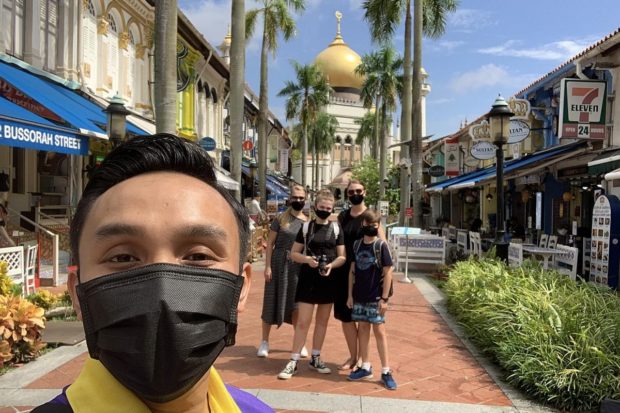
Mr Basirun Mansor (above) is one of the guides leading tours for Monster Day Tours, which launched a series of SG55 tours, in which all proceeds go to the guides. MONSTER DAY TOURS via The Straits Times/Asia News Network
SINGAPORE — Like many others in the tourism industry, tour guide Basirun Mansor, 29, has had a difficult year.
When tip-based walking tours, which he used to lead for home-grown operator Monster Day Tours, ceased in March, he delivered parcels and worked as a private-hire driver to make ends meet.
The father of a two-year-old girl earned about $2,000 doing that – about half of what he used to make pre-Covid-19. His wife’s business, an enrichment center-cum-art studio for children, also took a hit when it had to be shut during the circuit breaker.
Although he is grateful to have an income stream, Mr Basirun dearly misses the tourism industry, where he has worked for the past 10 years in various jobs such as customer service and at attractions in Sentosa.
So, he was delighted to return to guiding last month, leading a series of SG55 tours that Monster Day Tours launched at the end of last month.
Each tour, which can accommodate up to five people, costs $55, with the entire sum going to the guides.
For Mr Basirun, it is a far cry from the $150 to $200 a tour he used to earn. Still, every bit counts.
“Leading tours is my passion and these tours help to supplement my income,” he says.
Mr Suen Tat Yam, chief executive officer and founder of Woopa Group, parent company of Monster Day Tours, launched this initiative to support the dozen or so freelance guides whom the company works with on a regular basis.
He says when tours came to a standstill, many in the industry took a wait-and-see approach, hoping that the pandemic would blow over. Some took the opportunity to take a break.
But after a few months of the coronavirus raging on, it became clear that international borders would remain closed for a while and tough times were here to stay.
“Many guides took up alternative jobs like being safe-distancing ambassadors or private-hire drivers, but they still love guiding and sharing stories,” says Mr Suen, who has not drawn a salary since March.
Singapore’s travel industry has been struggling to cope with the fallout from Covid-19.
Hospitality group Banyan Tree and Resorts World Sentosa reported layoffs over the past few months and industry watchers expect the economic situation to worsen.
But there is a glimmer of hope for companies quick to cash in on residents’ yen for new experiences amid shut borders, says Ms Shirley Tee, a senior manager at Nanyang Polytechnic’s School of Business Management.
Domestic tourism is now the order of the day.
Indeed, Mr Suen says a tour of Jewel and Changi Airport, run in collaboration with Changi Airport Group, is one of Monster Day’s best performing tours, perhaps because Jewel is fairly new and some have yet to visit.
It is priced at $55 for five people, with freebies thrown in. Until the end of the month, Changi Airport tour participants get items such as gift cards worth $20, snacks from coffee shop Mr Teh Tarik and discounted tokens at Zone X arcade.
Meanwhile, all SG55 tour bookings include a $10 Grab voucher and two free tickets to a virtual bingo tour, which usually costs $10 a person.
Launched last month, virtual bingo tours are the company’s take on live-streamed tours, in which participants can win prizes such as Grab vouchers and $1,000 cash.
These new offerings are his company’s bid for survival as Mr Suen says the next six months will be “do-or-die”. “If virtual tours can take off and the company can generate enough income, we will be able to survive and continue supporting the guides too.”
Virtual tours are also TourHQ’s solution to the dearth of international travel.
Mrs Vandana Om Kumar, who founded the company that connects travelers with local guides and tour operators around the world, was initially at a loss when global lockdowns and border closures kicked in.
“The magnitude of the situation hit us and we realized that we aren’t coming out of this for a long time. Guides were calling us from all over the world and asking for loans. On top of not making money, we also had to give refunds,” she says.
The company, registered in Singapore and Hong Kong, was founded in 2012 and lists 35,000 guides and operators, including 105 from Singapore.
Mrs Om Kumar says although the company could not help every guide stay afloat, it was determined to try.
Last month, TourHQ launched a series of online tours, including walking tours condensed into hour-long, live-streamed experiences.
To do so, it trained guides on how to frame shots, interact with viewers and keep people engaged, working with them remotely to refine their product.
The company takes a 20 per cent commission, channelling most of it into marketing the online tours.
Out of 185 online experiences on offer at the moment, five are from Singapore, covering areas such as Chinatown, Kampong Glam and the civic district – a crowd favorite.
So far, Singapore guides have led online group tours for about 125 corporate guests to the civic district, such as members of the PHD Chamber of Commerce in India, a trade and industry body.
The company is also looking to work with schools worldwide on educational tours as well as offer live-stream campus tours, targeted at parents and prospective students hoping to study here and abroad.
Mrs Om Kumar says: “It’s how you react to the situation. You can sit back and say nothing is happening or you can take the bull by its horns and try to make the best of things.”